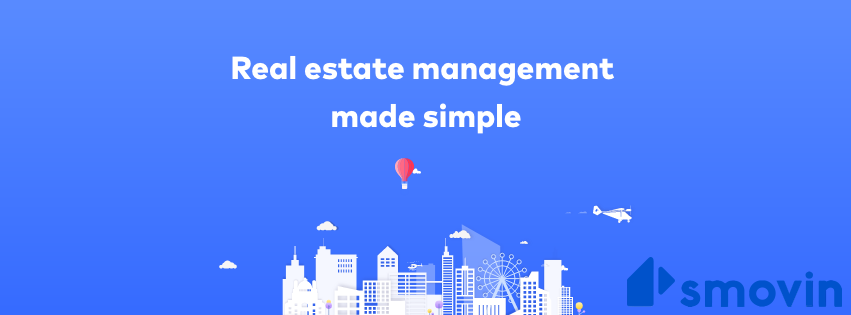The real estate and construction ecosystem is transitioning towards an integrated digital platform to better serve the customers. More so, the digital transformation of the industry has helped several companies to track, automate and synchronize the processes. The benefits of process automation such as clear communication, efficient processes and reduced failures have resulted in minimalizing business costs and push for higher profits.
We also noticed that the COVID-19 pandemic has accelerated the growth of proptech start-ups and forced many construction and real estate firms to use technology-driven automated platforms for their day-to-day operations. One of these platforms is Smovin.
Smovin’s mission is to empower property managers and investors by allowing them to focus on what really matters. This is done through a user-friendly solution that allows for task automations, streamlines workflows and helps you to manage your rentals with ease.
What are the pain-points you try to solve? What is Smovin’s value proposition?
We propose an online platform that integrates all property information (such as addresses, owners, contracts, invoices and much more) in one place. We also allow for tracking of late payment, automating a wide variety of tasks (reminders, indexations, …), terminations of contracts and accounting synchronization. All these aspects allow us to drastically simplify the property management while ensuring a high level of quality and accuracy.
Who are your targeted customers?
Through Smovin, customers can manage all their property types (Residential, Retail and Offices). We target real estate investors with an average of properties between 50 and 500.
How did COVID-19 affect you?
The COVID-19 crisis has had a great impact on the real estate industry. Indeed, at first, it has had a slow-down effect on many aspects but after sometime this has forced more and more investors to digitize their way of working.
What are your USPs (Unique Selling Points)?
Smovin empowers real estate investors through a unique solution. Along with its user-friendliness, it provides a simple way of connecting different tools such as accounting software or banking information. The information contained in those tools is then processed by the platform and compared with data introduced by the customer in order to create insightful data and allowing the customer to take the right decision on its real estate portfolio in due time.
Smovin is an innovative platform for ways of providing property management solutions to residential, retail and office property owners.
What differences do these asset classes create? How does the software manage the different classes?
Residential contracts are very much cornered by law and regulations. Indeed, for such types of contracts, tenants tend to be protected and this makes such types of contracts very standard. Having standard rules makes it easier to ensure our solution fits the requirements imposed by such contracts.
Managing retail contracts is much more complex. Indeed, those contracts allow for much more flexibility. With flexibility comes complexity, and the platform needs to be able to handle this flexibility while keeping its user-friendly touch. Many solutions are too limited in their functionalities and do not manage to model complex contracts. Some other solutions allow for such flexibility, but fail to make it user-friendly. At Smovin, we believe that we’ve hit a sweet spot where we are able to provide high flexibility with low complexity.
How do you compare the market maturity of today relative to 5 years ago and where do you see the adoption (technology) evolving?
The proptech industry is accelerating its growth to respond to the demand for new technologies and paperless processes. However, over the last 5 years, the real estate sector hasn’t experienced any crisis, the profitability margins are comfortable and the pressure of the competition is limited because of the many niche and local markets. Unlike other industries, Real Estate is less under the pressure of cost optimization, time management and a global competitive market. Consequently, we often see real estate organizations postponing their digital transformation to keep traditional tools such as Excel and to focus on the present rather than on their future development and needs.
How are your clients (from both low-end and high-end segments) engaging with your innovation?
Once the Real investors start their digital transformation, it is a game changer for them. Today, most of our clients could not imagine going back to traditional tools to manage their properties. This works only if the buyer has carefully chosen the right software solution for their needs. You can find multiple solutions on the internet and at any price (sometimes, for free!) but it should not be a cost-driven decision rather than a solution driven decision. The more expensive option can make you save a lot of money because it is tailored to your needs, easy to use and it comes with real human support. A cheap solution won’t charge you a lot but it will be a waste of time when you realize that it is not the right fit, and the amount of frustration will be significant. Time is money and a digital transformation will take you some time. You have to see it as a high-return investment for better management, control and forecast of your activities.
What about the future? What’s next?
Our vision of the future is the development of a digital ecosystem sourced with multiple data points to help property managers take data-driven decisions for their future investments. As an example, we are currently working on the development of a profitability calculator for each unit and extensively for your full patrimony. In the future, we also plan to work on the improvement of the relationship between the landlords and tenants. It is a big friction point that needs to be addressed in order to facilitate collaboration, communication, and lease contract renewals.
